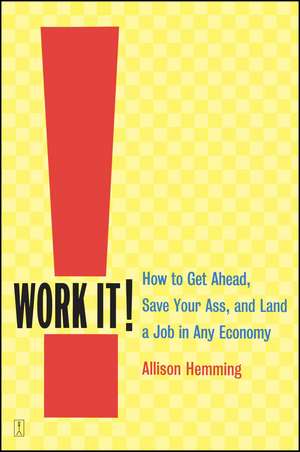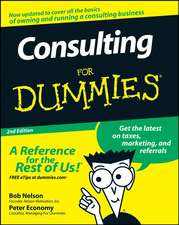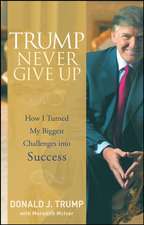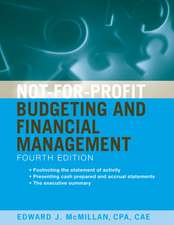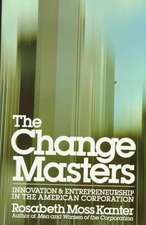Work It!: How to Get Ahead, Save Your Ass, and Land a Job in Any Economy
Autor Allison Hemmingen Limba Engleză Paperback – 7 ian 2003
Preparing for the biggest interview of your life?
Facing a layoff?
Have no fear. Work It! has all the strategies you need.
The work world isn't so friendly anymore. Landing the job you want takes a little more sweat in this tight job market, and keeping that job requires savvy and vigilance. This smart and comprehensive guide, packed with punchy, frank advice, gives you the tools and techniques that will help you get the most out of your job hunt. Allison Hemming, a noted career expert, delivers a needed dose of wisdom from the trenches in a manual that is perfectly updated to suit the modern work environment.
Work It! gives you the skinny on all you need to know, including:
• Step away from the computer -- the Internet may be ruining your job search
• Lose the McResume and get a grip on the lost art of correspondence
• The ABCs of networking -- don't wing it, work it!
• Training tips for peak interview performance
• Seal the Deal -- how to negotiate and accept a job the right way
If you are recently unemployed or see a layoff looming, there's a bonus Pink Slip section that will make you better able to bounce back and stay financially afloat during your job search. And for recent college grads, there's a road map for getting a J.O.B. degree. Alter your approach to job-hunting from this moment forward! Now go work it!
Preț: 116.37 lei
Nou
Puncte Express: 175
Preț estimativ în valută:
22.27€ • 24.20$ • 18.72£
22.27€ • 24.20$ • 18.72£
Carte disponibilă
Livrare economică 31 martie-14 aprilie
Preluare comenzi: 021 569.72.76
Specificații
ISBN-13: 9780743235495
ISBN-10: 0743235495
Pagini: 320
Dimensiuni: 140 x 214 x 23 mm
Greutate: 0.34 kg
Ediția:Original
Editura: Touchstone Publishing
Colecția Touchstone
ISBN-10: 0743235495
Pagini: 320
Dimensiuni: 140 x 214 x 23 mm
Greutate: 0.34 kg
Ediția:Original
Editura: Touchstone Publishing
Colecția Touchstone
Notă biografică
Allison Hemming is the founder of The Hired Guns, an interim workforce agency. She lives in New York City.
Extras
Chapter One: Get Out of Your Own Way: Diversify, and Get the Job You Really Want
Economies will rise and fall, but you, my friend, will always need a job. (Unless, of course, you're already rich and successful beyond your wildest dreams, in which case you can close this book now.) Instead of betting the farm on which way the economy's heading, you need to make your job search independent of the economy. It's going to be a very long time before we see a job market fueled by as much hubris, hype, and cash as that of the late 1990s. Back then, we could write our own tickets, choose among a variety of glamorous jobs, and reap fat salaries. Those days are long gone.
Somewhere in the midst of the boom years, we lost our grip on (or never learned) time-tested job-hunting strategies. We believed that the Internet would make finding a job (like everything else) easy, cheap, fast, and painless. The result: today, around the country, hiring managers and recruiters are scratching their heads, wondering where the solid candidates have gone. Left in their place are applicants devoid of passion, politeness, and proper business acumen. As painful as it may be to admit, you are probably one of these applicants, at least in some respects. If you are looking for a job right now, are finding it's going badly, and can't figure out why, chances are you are one of the clueless ones.
Face it, that's going to have to change. Job hunting is something you must get good at, because you're going to be doing it a lot more often. Data from the U.S. Bureau of Labor Statistics shows that before you retire, you can expect to change jobs at least ten times and switch careers at least three times. Successful job seekers know that old school is fast becoming new school. Networking, building relationships, personalizing and tailoring your job search, and focusing on what you want and where you fit best are skills that will never let you down. In this book, you can look forward to a hearty helping of no-holds-barred advice (tough love, if you like) on how you can get your job search on track and land your next job -- no matter which direction the economy is headed.
Inertia Will Be Your Real Enemy
A body at rest tends to stay at rest. It's nearly impossible to land a job by sitting around in your pajamas surfing the web. Even when the economy was going gangbusters, people still had to put on nice clothes and go meet other human beings for interviews. Here's the bottom line: people don't like job hunting because it's time-consuming, a little scary, and often involves rejection. The good news is that if you can live through being single and dating, you can survive and excel at a job hunt. Just don't try to look for the easy way out. You're not looking for a one-night stand; you want a long, stable relationship.
The most effective jobhunters are the ones that never stop hunting. If you plan on actively managing your career, you need to be out there looking all the time. This isn't to say that you should be interviewing 24/7, but you do have to put yourself in the mix so that you're aware of opportunities and can take advantage of them as they arise. Start by pressing the flesh and making contact with real live human beings on a regular basis. You will get back what you put in. This means that if you approach your job hunt passively, you can expect recruiters and hiring managers to respond passively to you.
For most people, job hunting does suck, but it doesn't have to. It's impossible to get a new job, one that you really want, unless you're keeping your "tentacles" out there. Get realistic about how long it will take to find the job. Don't wait until you're desperate. A good rule of thumb is to expect the search to last about 4 to 6 months from start to contract signing. That duration might be shortened if you're approached directly by a headhunter for a specific job or you're getting poached by a direct competitor. Or it could take even longer if you're looking for a highly competitive, unique, or senior position. Also, if you're undergoing a career transition, the process can even approach a year as you reposition yourself for different types of opportunities. Don't wait until you're forced to start your job hunt. If you hold off until you feel pressured to quit, you get laid off, or you graduate without a job lined up, you're waiting too long. If you're out there all the time, you won't fall out of practice when it comes time to do research, to network, to interview, or to follow up. You'll get so comfortable with job hunting that the stress and anxiety that usually go along with it will be greatly reduced. This way, when there's a job you really want to land, you'll be ready to shine.
Being open to other job opportunities even when you're employed doesn't make you a Benedict Arnold. You're just looking out for number one. Keep in mind, you're not required to take the first job that comes your way. In fact, sometimes the best thing to do is stay put and work hard to get promoted internally -- the same rules apply to internal and external job hunts.
LOSE THE ENTITLEMENT
Repeat the motto: I do not have the job until I have the job. Time and time again, candidates walk into hiring managers' offices demanding and expecting things long before it's appropriate to do so. If this is you, it's time to adjust your attitude. Companies can and will live without you. Even with the perfect work experience and a summa cum laude degree from a top school, a person with a bad attitude at a company is quite simply a bad seed. While you may in fact be the greatest thing since sliced bread, confidence should never be confused with arrogance. Beware of subtle demands that you might hint at in your cover letter, during interviews, or in your follow-up emails. Even simple things like not following directions can rub people the wrong way. That's why you need to have other people check your work before it goes out and why you need to practice before you go into interviews. You've got very little time in front of decision-makers these days, and if you don't put your best foot forward, you will not get anywhere. You're not owed the perfect job; that, my friend, has to be earned.
I detest self-worship. Don't drone on about why the world can't live without you (hint: they can). Whenever a candidate does this, a red flag pops up, as these folks usually over-inflate their accomplishments and misrepresent their past job responsibilities.
-- MARK, CHIEF TECHNOLOGY OFFICER
DIVERSIFY OR DIE
Most people's biggest problem with their job hunt is relying too much on one single strategy, like posting their resumes to online job boards, instead of using the web to augment tried and true, old-school methods of job hunting like networking. It's time to mix it up. Why? Because job hunting is tough -- and ultra-competitive. Over-dependence on any one technique will severely impair your efforts.
If you're going to have a successful job hunt, you can no longer discount old standbys like resumes, cover letters, and thank-you notes. They are an intrinsic part of job hunting. If you intend to blow them off, or don't plan on treating them as essential, stop reading now (no, really). Think about it this way: if you were going into combat, you'd want to survive multiple confrontations and deal with whatever situation you encounter. You wouldn't want a canteen that leaked water or a rifle that shot blanks. The same holds true for the job hunt. Your war chest should be well stocked with the following basics: a Master Resume from which you can craft individual customized resumes; an array of cover letters and thank-you notes that you can draw upon and personalize; and a database or spreadsheet (or Rolodex) of all your contacts including references, colleagues, business contacts, and companies you want to work for. You also need consistent and easy access to a non-work computer and fax machine (Kinko's will do, but think about investing in your own if you don't have them already), a personal email account that you will use only for your job hunt, a calendar to map out your strategy, and stationery.
Having a well-stocked war chest won't get you the job by itself, but it's a proactive step to getting yourself organized so that you'll find it easier to navigate through the challenges that lie ahead.
WALK A MILE IN THE OTHER PERSON'S SHOES
The one thing that job seekers seem to forget most often is thinking about the needs of the hiring community and the interests of the people helping them along in their job hunt. Before you email, call, interview, or follow up with anyone, take a minute to put yourself in his or her shoes. Ask yourself, What matters to this person? What can I say or do to let them know that I understand their needs? You should do this for everyone from headhunters, recruiters, and hiring managers to your business contacts and the people you plan to use as your references.
On that note, while it's important to have your own agenda and schedule, it is absolutely essential to remember that you are also working under the timetable of your prospective employers. The best companies -- and the ones you want to work for -- take their time and exercise due diligence when they hire new employees. However much a body is needed, the wrong hire will make an organization worse off than no hire. Industry statistics suggest the cost of even one bad hiring decision can exceed one hundred thousand dollars, taking into account the time spent recruiting, hiring, and training the hiree and the amount of time the job is left undone or done badly by an unqualified applicant. You need to respect the timetable, without pressuring anyone. Also, remember that the headhunter's reputation is on the line every time a company hires one of their candidates. While you may feel the process is slow moving, there are established procedures and channels that recruiters and clients set up before beginning an engagement.
Most job seekers are obsessed with asking for what they want instead of thinking about what the other person needs. Their utter cluelessness is your big break! If you get behind enemy lines and study what recruiters and hiring managers want, you'll leave your competition in the dust. If you work hard to make the other person's job easier, you'll be more successful, hands down. It really is as easy as that.
I was recently very gung-ho about bringing in one particular candidate for an introductory interview. He had all the right credentials and a great track record. Then I met him. The guy was so pompous that I wanted to toss him out of my office in no less than five minutes. The first thing out of his mouth was a question about what we were prepared to give him as an offer because he was deciding between my firm and our direct competitor. I let him know that he might want to go ahead and take the other job because his chances of getting an offer from us were slim: this was his first interview, he still had a lot of people to meet, and he was already on my bad side.
-- THERESA, BRAND MANAGER
NOW GO WORK IT!
Here's the Takeaway:
• Job hunting is 24/7; you need to be looking constantly.
• For best results, diversify your job hunt by combining old-school techniques with new ones.
• Lose the attitude and you'll get a lot further.
• Think about the needs of the people you're interviewing with.
Copyright © 2003 by Allison Hemming
Economies will rise and fall, but you, my friend, will always need a job. (Unless, of course, you're already rich and successful beyond your wildest dreams, in which case you can close this book now.) Instead of betting the farm on which way the economy's heading, you need to make your job search independent of the economy. It's going to be a very long time before we see a job market fueled by as much hubris, hype, and cash as that of the late 1990s. Back then, we could write our own tickets, choose among a variety of glamorous jobs, and reap fat salaries. Those days are long gone.
Somewhere in the midst of the boom years, we lost our grip on (or never learned) time-tested job-hunting strategies. We believed that the Internet would make finding a job (like everything else) easy, cheap, fast, and painless. The result: today, around the country, hiring managers and recruiters are scratching their heads, wondering where the solid candidates have gone. Left in their place are applicants devoid of passion, politeness, and proper business acumen. As painful as it may be to admit, you are probably one of these applicants, at least in some respects. If you are looking for a job right now, are finding it's going badly, and can't figure out why, chances are you are one of the clueless ones.
Face it, that's going to have to change. Job hunting is something you must get good at, because you're going to be doing it a lot more often. Data from the U.S. Bureau of Labor Statistics shows that before you retire, you can expect to change jobs at least ten times and switch careers at least three times. Successful job seekers know that old school is fast becoming new school. Networking, building relationships, personalizing and tailoring your job search, and focusing on what you want and where you fit best are skills that will never let you down. In this book, you can look forward to a hearty helping of no-holds-barred advice (tough love, if you like) on how you can get your job search on track and land your next job -- no matter which direction the economy is headed.
Inertia Will Be Your Real Enemy
A body at rest tends to stay at rest. It's nearly impossible to land a job by sitting around in your pajamas surfing the web. Even when the economy was going gangbusters, people still had to put on nice clothes and go meet other human beings for interviews. Here's the bottom line: people don't like job hunting because it's time-consuming, a little scary, and often involves rejection. The good news is that if you can live through being single and dating, you can survive and excel at a job hunt. Just don't try to look for the easy way out. You're not looking for a one-night stand; you want a long, stable relationship.
The most effective jobhunters are the ones that never stop hunting. If you plan on actively managing your career, you need to be out there looking all the time. This isn't to say that you should be interviewing 24/7, but you do have to put yourself in the mix so that you're aware of opportunities and can take advantage of them as they arise. Start by pressing the flesh and making contact with real live human beings on a regular basis. You will get back what you put in. This means that if you approach your job hunt passively, you can expect recruiters and hiring managers to respond passively to you.
For most people, job hunting does suck, but it doesn't have to. It's impossible to get a new job, one that you really want, unless you're keeping your "tentacles" out there. Get realistic about how long it will take to find the job. Don't wait until you're desperate. A good rule of thumb is to expect the search to last about 4 to 6 months from start to contract signing. That duration might be shortened if you're approached directly by a headhunter for a specific job or you're getting poached by a direct competitor. Or it could take even longer if you're looking for a highly competitive, unique, or senior position. Also, if you're undergoing a career transition, the process can even approach a year as you reposition yourself for different types of opportunities. Don't wait until you're forced to start your job hunt. If you hold off until you feel pressured to quit, you get laid off, or you graduate without a job lined up, you're waiting too long. If you're out there all the time, you won't fall out of practice when it comes time to do research, to network, to interview, or to follow up. You'll get so comfortable with job hunting that the stress and anxiety that usually go along with it will be greatly reduced. This way, when there's a job you really want to land, you'll be ready to shine.
Being open to other job opportunities even when you're employed doesn't make you a Benedict Arnold. You're just looking out for number one. Keep in mind, you're not required to take the first job that comes your way. In fact, sometimes the best thing to do is stay put and work hard to get promoted internally -- the same rules apply to internal and external job hunts.
LOSE THE ENTITLEMENT
Repeat the motto: I do not have the job until I have the job. Time and time again, candidates walk into hiring managers' offices demanding and expecting things long before it's appropriate to do so. If this is you, it's time to adjust your attitude. Companies can and will live without you. Even with the perfect work experience and a summa cum laude degree from a top school, a person with a bad attitude at a company is quite simply a bad seed. While you may in fact be the greatest thing since sliced bread, confidence should never be confused with arrogance. Beware of subtle demands that you might hint at in your cover letter, during interviews, or in your follow-up emails. Even simple things like not following directions can rub people the wrong way. That's why you need to have other people check your work before it goes out and why you need to practice before you go into interviews. You've got very little time in front of decision-makers these days, and if you don't put your best foot forward, you will not get anywhere. You're not owed the perfect job; that, my friend, has to be earned.
I detest self-worship. Don't drone on about why the world can't live without you (hint: they can). Whenever a candidate does this, a red flag pops up, as these folks usually over-inflate their accomplishments and misrepresent their past job responsibilities.
-- MARK, CHIEF TECHNOLOGY OFFICER
DIVERSIFY OR DIE
Most people's biggest problem with their job hunt is relying too much on one single strategy, like posting their resumes to online job boards, instead of using the web to augment tried and true, old-school methods of job hunting like networking. It's time to mix it up. Why? Because job hunting is tough -- and ultra-competitive. Over-dependence on any one technique will severely impair your efforts.
If you're going to have a successful job hunt, you can no longer discount old standbys like resumes, cover letters, and thank-you notes. They are an intrinsic part of job hunting. If you intend to blow them off, or don't plan on treating them as essential, stop reading now (no, really). Think about it this way: if you were going into combat, you'd want to survive multiple confrontations and deal with whatever situation you encounter. You wouldn't want a canteen that leaked water or a rifle that shot blanks. The same holds true for the job hunt. Your war chest should be well stocked with the following basics: a Master Resume from which you can craft individual customized resumes; an array of cover letters and thank-you notes that you can draw upon and personalize; and a database or spreadsheet (or Rolodex) of all your contacts including references, colleagues, business contacts, and companies you want to work for. You also need consistent and easy access to a non-work computer and fax machine (Kinko's will do, but think about investing in your own if you don't have them already), a personal email account that you will use only for your job hunt, a calendar to map out your strategy, and stationery.
Having a well-stocked war chest won't get you the job by itself, but it's a proactive step to getting yourself organized so that you'll find it easier to navigate through the challenges that lie ahead.
WALK A MILE IN THE OTHER PERSON'S SHOES
The one thing that job seekers seem to forget most often is thinking about the needs of the hiring community and the interests of the people helping them along in their job hunt. Before you email, call, interview, or follow up with anyone, take a minute to put yourself in his or her shoes. Ask yourself, What matters to this person? What can I say or do to let them know that I understand their needs? You should do this for everyone from headhunters, recruiters, and hiring managers to your business contacts and the people you plan to use as your references.
On that note, while it's important to have your own agenda and schedule, it is absolutely essential to remember that you are also working under the timetable of your prospective employers. The best companies -- and the ones you want to work for -- take their time and exercise due diligence when they hire new employees. However much a body is needed, the wrong hire will make an organization worse off than no hire. Industry statistics suggest the cost of even one bad hiring decision can exceed one hundred thousand dollars, taking into account the time spent recruiting, hiring, and training the hiree and the amount of time the job is left undone or done badly by an unqualified applicant. You need to respect the timetable, without pressuring anyone. Also, remember that the headhunter's reputation is on the line every time a company hires one of their candidates. While you may feel the process is slow moving, there are established procedures and channels that recruiters and clients set up before beginning an engagement.
Most job seekers are obsessed with asking for what they want instead of thinking about what the other person needs. Their utter cluelessness is your big break! If you get behind enemy lines and study what recruiters and hiring managers want, you'll leave your competition in the dust. If you work hard to make the other person's job easier, you'll be more successful, hands down. It really is as easy as that.
I was recently very gung-ho about bringing in one particular candidate for an introductory interview. He had all the right credentials and a great track record. Then I met him. The guy was so pompous that I wanted to toss him out of my office in no less than five minutes. The first thing out of his mouth was a question about what we were prepared to give him as an offer because he was deciding between my firm and our direct competitor. I let him know that he might want to go ahead and take the other job because his chances of getting an offer from us were slim: this was his first interview, he still had a lot of people to meet, and he was already on my bad side.
-- THERESA, BRAND MANAGER
NOW GO WORK IT!
Here's the Takeaway:
• Job hunting is 24/7; you need to be looking constantly.
• For best results, diversify your job hunt by combining old-school techniques with new ones.
• Lose the attitude and you'll get a lot further.
• Think about the needs of the people you're interviewing with.
Copyright © 2003 by Allison Hemming
Cuprins
Contents
Introduction
Part One: Everything You Know Is Wrong
1. Get Out of Your Own Way: Diversify, and Get the Job You Really Want
2. The Internet Is Ruining Your Job Search: Put Down the Mouse and Step Away from the Computer
3. Stand Out from the Pack: Tattoos Aren't the Only Way to Brand Yourself
4. Networking: Get Hired with a Little Help from Your Friends
Part Two: Back to Basics
5. Lose the McResume: Five-Star Resumes for a Fast-Food World
6. The Lost Art of Correspondence: You Are What You Write
7. Get Primed: Training Tips for Peak Interview Performance
8. Be a Rock Star: How to Shine in the Interview Arena
9. Seal the Deal: Know When to Hold and When to Fold
Part Three: Break Open in Case of Emergency!
10. The Vultures Are Circling: What to Do Immediately Before and After You Get Downsized
11. Pink Slip to Paycheck: Avoid Pink Slip Paralysis and Put Your Layoff Behind You
12. Successful Unemployment: Belt Tightening and Budgeting When You're Looking for Work
13. Welcome to the Real World: From Higher Learning to Higher Earning
Final Words
Acknowledgments
Index
Introduction
Part One: Everything You Know Is Wrong
1. Get Out of Your Own Way: Diversify, and Get the Job You Really Want
2. The Internet Is Ruining Your Job Search: Put Down the Mouse and Step Away from the Computer
3. Stand Out from the Pack: Tattoos Aren't the Only Way to Brand Yourself
4. Networking: Get Hired with a Little Help from Your Friends
Part Two: Back to Basics
5. Lose the McResume: Five-Star Resumes for a Fast-Food World
6. The Lost Art of Correspondence: You Are What You Write
7. Get Primed: Training Tips for Peak Interview Performance
8. Be a Rock Star: How to Shine in the Interview Arena
9. Seal the Deal: Know When to Hold and When to Fold
Part Three: Break Open in Case of Emergency!
10. The Vultures Are Circling: What to Do Immediately Before and After You Get Downsized
11. Pink Slip to Paycheck: Avoid Pink Slip Paralysis and Put Your Layoff Behind You
12. Successful Unemployment: Belt Tightening and Budgeting When You're Looking for Work
13. Welcome to the Real World: From Higher Learning to Higher Earning
Final Words
Acknowledgments
Index
